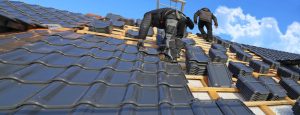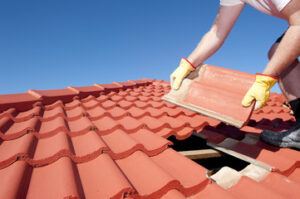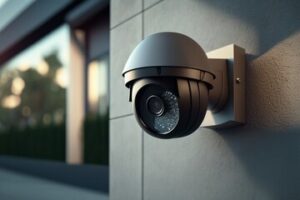A professional Erie Roofing company has a deep understanding of different roof systems, materials, and installation techniques. They also know how to identify issues that can escape the untrained eye and adhere to safety standards to minimize risks during the job.
In addition, a professionally installed and maintained roof boosts curb appeal and adds value to the property. This makes it easier to sell or lease the property in the future.

Time Efficiency
Professional roofing contractors are committed to finishing projects within set timelines. They’re also well-versed in building codes and roofing warranties, ensuring that all work is done properly from start to finish. This prevents expensive mistakes that might require costly repairs down the road.
A visually appealing and well-maintained roof adds to a home’s curb appeal and increases its market value. It also minimizes the need for future repairs, cutting down on energy costs. Professional roofing services offer a wide range of maintenance, repair, and installation options that fit your home or business needs.
Unlike DIY roofing projects, professional services are equipped with the proper tools and equipment to ensure the safety of both workers and property. From personal protective equipment to perimeter flag lines and permanent safety rails, these professionals are unwavering in their commitment to safety. This prevents accidents and injuries and helps speed up the project’s completion. It also helps minimize downtime for your business and protects you from financial liability. This benefit alone makes hiring professional roofers a wise investment that pays for itself in the long run.
Expertise and Experience
Professional roofing contractors have years of hands-on experience and a deep understanding of different roofing materials, designs, and safety standards. This expertise helps them to provide the best possible results and safeguard their clients’ investments for years to come.
Roofing professionals also have access to premium roofing materials at competitive prices. This allows them to offer superior roof repairs that are more cost-effective in the long run than DIY projects. Additionally, they can advise their clients on the best ways to care for their roofs to maximize their lifespan.
The condition of your roof affects many aspects of your property, including security, energy efficiency, and value. A well-maintained roof is an important selling point if you decide to sell your home in the future.
Additionally, a professional roofing service can enhance the aesthetics of your home, which can significantly impact its curb appeal and value. This is an excellent way to make a wise investment that saves you money over time.
Safety
A high-quality roof is an excellent way to add value to your home. A professionally installed or maintained roof can bolster your home’s curb appeal, and potential buyers will be willing to pay a premium for such a desirable property feature.
Professional roofing companies use advanced safety measures to mitigate any risks associated with their work. This can save both you and them the headaches of accidents, injuries, and delays that come with amateurs attempting to do the job themselves.
Local roofing contractors are also familiar with the building codes and regulations in your area, so you can be sure that any work they do is in compliance with these requirements. This is a crucial factor for avoiding fines and other legal complications down the line. Safety goes hand in hand with streamlined processes and efficiency, which helps ensure that your roofing project is done on time and correctly. This helps reduce the risk of future repairs and maintains the integrity of your roof for years to come. A good contractor will also be able to provide you with warranties on both their work and the materials used, which offer additional financial protection.
Environmentally Friendly Practices
In addition to the safety, warranty protection, and efficiency benefits, professional roofing companies have a vested interest in environmentally friendly practices. They’re able to identify and address minor issues before they become major problems, which reduces the need for future repairs and reduces overall energy usage. They also have better access to eco-friendly materials and can help you choose sustainable options for your roof.
For example, many roofing contractors are now implementing solutions to divert industrial waste from landfills. One company’s shingle manufacturing facility alone saves enough shingles to fill the stadium five times yearly, which is an incredible achievement!
Additionally, roofing professionals can advise on and install energy-efficient systems to lower a building’s electricity use. These systems minimize heat absorption, reduce cooling energy needs, and mitigate urban heat island effects. Additionally, they can implement green roofs that absorb stormwater runoff and help reduce the strain on drainage systems. With a variety of eco-friendly roofing options available, you’re sure to find an option that suits your property’s specific needs. And, best of all, these green solutions can increase the value of your home or business while reducing your environmental footprint!
Customer Satisfaction
Professional roofing companies have a reputation to maintain and are committed to ensuring their clients are satisfied with the services they provide. They communicate effectively, follow thorough safety procedures, and answer any questions or concerns promptly. The result is a smooth and efficient roof installation or repair project that saves time and money in the long run.
Roofing projects are subject to local and national building codes, which professional roofers are familiar with. They ensure that all aspects of the roof meet these standards to protect homeowners from costly repairs and energy inefficiencies. They also offer warranties on materials and labor to give homeowners peace of mind.
In addition to ensuring that your roof is properly installed and maintained, a professional roofing company can improve the overall value of your home or commercial property. A well-maintained roof is a selling point that demonstrates to potential buyers or tenants that the property has been well-cared for. This can increase your chances of a quick and profitable sale or lease. In addition, regular inspections and maintenance by a qualified roofing company can prevent major problems from developing in the future, thereby saving you money.

